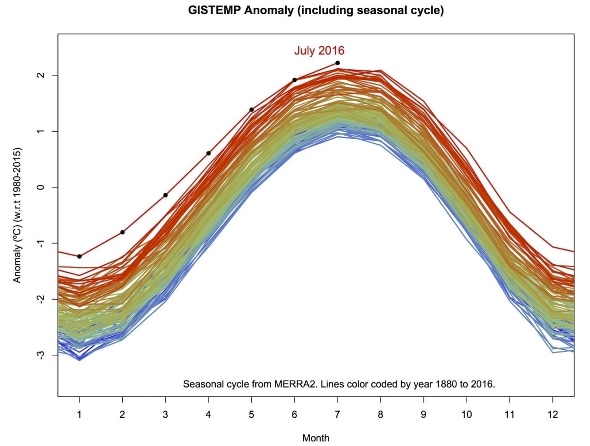Create a free profile to get unlimited access to exclusive videos, sweepstakes, and more!
Follow-Up: Just How Hot Was July 2016?

The other day I posted an article about how ridiculously warm July 2016 was globally. Like every month for 10 months in a row, it was the hottest such month since records have been reliably kept (starting in 1880).
This happens so often now that I just repost the same article, with the dates and numbers updated. That’s one way you know the planet’s getting hotter: When every record hot month or year is the month or year you’re in, it’s getting hotter.
But there’s more to this. July is generally the hottest month globally in the year, because it’s summer in the Northern Hemisphere, which has more land mass than the Southern one. Land heats up faster than ocean, so northern summer adds more to the overall warmth. This means July was not only the hottest July on record, but the hottest month on record as well.*
The plot at the top of this article shows that, with July clearly in a class by itself. It also shows that 2016 is hugely favored to be the hottest year globally on record, beating the previous two record holders: 2014 and 2015 (and please read the second paragraph above again if that helps you put this in context).
But it’s worse than that. Records being broken is one thing, but even then you have to look at the trend.
There are various ways to do that, but our brains are keyed to see motion. To that point, here’s an animation of that same graph above, showing each year’s monthly temperatures since records began:
That animations shows temperature anomalies, the deviation from some average (in this case, the annual average over the date range of 1980 to 2015). As you can see, the yearly graph shifts up and down somewhat randomly until just after the mid-20th century, when the average just starts going up. That’s warming. And this plot downplays the data somewhat, because the average is taken so recently, when global warming already had us in its grasp. Had an earlier average been used (say, 1951–1980, which is a commonly used range) then the scale on the left would show higher numbers.
Deniers downplay all this. They say that it’s been hotter in the past, and that the climate changes all the time. Like so many anti-science claims, that’s a tiny parcel of truth surrounded by a huge dollop of crap. Of course it’s been hotter in the past. Of course climate changes. But the rate of global warming we are seeing now is unprecedented, faster by a huge margin than we’ve seen for more than 10,000 years.
That’s why this is scary. It’s how fast the temperature is climbing. The effects we are seeing now are getting pretty obvious, too. Watch this NASA animation of the Arctic ice melting based on satellite observations, starting from its maximum extent in March 2016 to August (note that the minimum extent won’t be reached until September):
While 2016 is unlikely to set a record low extent of ice, every year for the past decade has been far, far below average. How long will it be before we see an ice-free Arctic summer? A few decades. Not centuries, but decades.
I could go on and on, and believe me I have. It’s stunning that people will still deny the reality of global warming, and ignore the slap-in-the-face effects it’s having on our climate. We know this is happening, and politicians fiddle while the Earth burns.
And as I have also said many times: It’s not too late, and there are things we can do. If you’re a U.S. citizen, where this political problem may be biggest, (politely) let your representatives know you care about this issue, and when November comes, vote.
We all live on this planet, and it’s the only one we’ve got. Let’s end this uncontrolled geoengineering experiment while we still can.
*When I tweeted about it, I meant to say “No human alive today has lived through a hotter July. Ever,” but forgot to add the words “alive today.” A lot of pedants jumped over me about that, when still the meaning was clear in the article. I accept I misphrased it, but it would be kinda nice if people actually clicked a link and read an article before going full denial on the internet. A man can dream.


























